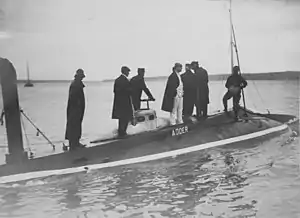USS Adder
USS Adder (Submarine Torpedo Boat No. 3), later renamed A-2, was one of seven Plunger-class submarines built for the United States Navy (USN) in the first decade of the 20th century.
 Adder running trials in Long Island Sound, 1903 | |
| History | |
|---|---|
| Name | Adder |
| Namesake | Vipera berus |
| Ordered | 7 June 1900 |
| Awarded | 25 August 1900 |
| Builder | |
| Laid down | 3 October 1900 |
| Launched | 22 July 1901 |
| Sponsored by | Mrs. Jane S. Wainwright |
| Commissioned | 12 January 1903 |
| Decommissioned | 26 July 1909 |
| Commissioned | 10 February 1910 |
| Decommissioned | 12 December 1919 |
| Renamed | A-2 (Submarine Torpedo Boat No. 3), 17 November 1911 |
| Stricken | 16 January 1922 |
| Identification | Hull symbol:SS-3, 17 July 1920 |
| Fate | Designated for use as a target, 24 September 1920 and expended mid-January 1922 |
| General characteristics | |
| Class and type | Plunger-class submarine |
| Displacement |
|
| Length | 63 ft 10 in (19.46 m) |
| Beam | 11 ft 11 in (3.63 m) |
| Draft | 10 ft 7 in (3.23 m) |
| Installed power |
|
| Propulsion |
|
| Speed |
|
| Test depth | 150 ft (45.7 m) |
| Complement | 7 officers and enlisted |
| Armament | 1 × bow 18 inch (450 mm) torpedo tube |
| Armor | Conning tower#Submarines: 3+5⁄8 in (92 mm) |
Construction
Adder was laid down on 3 October 1900 at the Crescent Shipyard, Elizabethport, New Jersey, by Lewis Nixon, a subcontractor for the Holland Torpedo Boat Company, New York City; launched on 22 July 1901; sponsored by Mrs. Jane S. Wainwright, wife of Rear Admiral Richard Wainwright. Adder was commissioned on 12 January 1903 at the Holland Torpedo Boat Station at New Suffolk, New York with Ensign Frank L. Pinney in command.[1] She was the second submarine commissioned in the United States Navy after USS Holland (SS-1).
Design
The Plunger-class submarines were enlarged and improved versions of the preceding Holland, the first submarine in the USN. They had a length of 63 ft 10 in (19.5 m) overall, a beam of 11 ft 11 in (3.6 m) and a mean draft of 10 ft 7 in (3.2 m). They displaced 107 long tons (109 t) on the surface and 123 long tons (125 t) submerged. The Plunger-class boats had a crew of one officer and six enlisted men. They had a diving depth of 150 feet (45.7 m).[2]

For surface running, they were powered by one 180-brake-horsepower (134 kW) gasoline engine that drove the single propeller. When submerged the propeller was driven by a 70-horsepower (52 kW) electric motor.[2] The boats could reach 8 kn (15 km/h; 9.2 mph) on the surface and 7 kn (13 km/h; 8.1 mph) underwater.[3]
The Plunger-class boats were armed with one 18-inch (457 mm) torpedo tube in the bow. They carried two reloads, for a total of three torpedoes.[2]
Service history
After initial experimental duty at the Naval Torpedo Station at Newport, Adder was towed to the Norfolk Naval Shipyard by the tug Peoria, arriving there on 4 December 1903. In January 1904, the submarine torpedo boat was assigned to the Reserve Torpedo Flotilla. Placed out of commission on 26 July 1909, Adder was loaded onto the collier Caesar, and was transported to the Philippines, arriving on 1 October.[1]

Recommissioned on 10 February 1910, she was assigned to duty with the 1st Submarine Division, Asiatic Torpedo Fleet. Over almost a decade, the submarine torpedo boat operated from Cavite and Olongapo, principally in training and experimental work. During this time, she was renamed on 17 November 1911, becoming simply A-2 (Submarine Torpedo Boat No. 3).[1]
World War I
During World War I, she carried out patrols off the entrance to Manila Bay, and around the island of Corregidor. Decommissioned on 12 December 1919, A-2 (assigned the alphanumeric hull number "SS-3" on 17 July 1920) was designated for use as a target on 24 September 1920.[1] Sunk as a target in mid-January 1922,[4] she was struck from the Naval Vessel Register on 16 January 1922.[1]
Notes
References
- "A-2 (Submarine Torpedo Boat No. 3)". Dictionary of American Naval Fighting Ships. Navy Department, Naval History & Heritage Command. 31 August 2016. Retrieved 11 October 2016.
 This article incorporates text from this source, which is in the public domain.
This article incorporates text from this source, which is in the public domain. - Friedman, Norman (1995). U.S. Submarines Through 1945: An Illustrated Design History. Annapolis, Maryland: Naval Institute Press. ISBN 1-55750-263-3.
- Gardiner, Robert & Gray, Randal, eds. (1985). Conway's All the World's Fighting Ships 1906–1921. Annapolis, Maryland: Naval Institute Press. ISBN 0-85177-245-5.
- Wright, C. C. (2003). "Question 40/02: Submarines Expended as Targets 1922". Warship International. XL (4): 286–298. ISSN 0043-0374.
External links
- history.navy.mil: USS Adder Photos
- Photo gallery of USS Adder at NavSource Naval History
- hazegray.org: USS Adder
- Crescent Shipyard Information on Lewis Nixon's Crescent Shipyard, location of John P. Holland's site of operations in Elizabethtown, New Jersey.
